Today Current Affairs: 19th September 2022 for UPSC IAS exams, State PSC exams, SSC CGL, State SSC, RRB, Railways, Banking Exam & IBPS, etc
Table of Contents
Blood Donation:
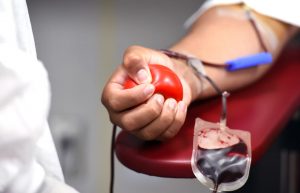
India scripted a new world record of maximum number of blood donations in a single day on the occasion of the 72nd birthday of Prime Minister Narendra Modi under ‘Raktdaan Amrit Mahotsav’.
- This was the largest country-wide Blood Donation Drive.
- The campaign was aimed at increasing awareness regarding regular non-remunerated voluntary blood donations and ensure that blood or its components are available, accessible, affordable and safe.
- As per 2021 statistics, India’s annual requirement is around 1.5 crore units.
- In India, the regulatory framework for blood donation and blood bank management rests with the Central Drugs Standard Control Organisation, while technical bodies like the National Blood Transfusion Council and National AIDS Control Organisation formulate guidelines and recommendations for transfusion medicine and blood bank management.
East Asia Summit Economic Ministers Meeting:
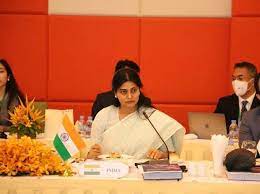
Minister of Commerce and Industry, Anupriya Patel, attended East Asia Summit Economic Ministers’ Meeting in Siem Reap City of Cambodia.
- The meeting saw representation from all 10 ASEAN countries as well as eight partner countries including Australia, China, India, Japan, New Zealand, South Korea, Russia and the US.
- The East Asia Summit (EAS) is the Indo-Pacific’s premier forum for strategic dialogue.
- The EAS has 18 members – the ten ASEAN countries (Brunei, Cambodia, Indonesia, Laos, Malaysia, Myanmar, the Philippines, Singapore, Thailand, Vietnam) along with Australia, China, India, Japan, New Zealand, the Republic of Korea, Russia and the United States. ASEAN leads the forum, and the chair position rotates between ASEAN Member States annually.
- The EAS calendar culminates in the annual Leaders’ Summit, which is usually held alongside ASEAN Leaders’ meetings in the fourth quarter of every year.
- In addition to the Leaders’ Summit, meetings of EAS Foreign Ministers and Economic Ministers are held annually.
Ethereum : World’s Second Most Valuable Cryptocurrency

Ethereum, the world’s second most valuable cryptocurrency, has completed a significant software overhaul which promises to ramp up security of the cryptocurrency while claiming to cut down on its carbon footprint, nearly entirely.
- The revamp, known as ‘The Merge,’ will cast aside the need for crypto miners and gigantic mining farms, who had previously driven the blockchain under a mechanism called ‘proof-of-work’ (PoW).
- Instead, it has now shifted to a ‘proof-of-stake’ (PoS) mechanism that assigns ‘validators’ randomly to approve transactions and earn a small reward.
- The move to PoS will reduce ethereum’s energy consumption by nearly 99.95 per cent.
- Ethereum is still a decentralised platform, but under the new concept, it would not need miners and mining farms to authenticate transactions anymore.
- Instead, a validator will be randomly assigned using an algorithm from a pool of people who ‘stake’ their coins, which essentially means pledging at least 32 Ethereum tokens on the network.
- This would entirely eliminate the need for miners on the Ethereum network.
7th Eastern Economic Forum:
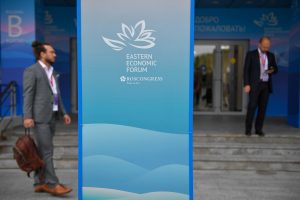
Russia hosted the 7th Eastern Economic Forum (EEF) at Vladivostok.
- The forum is a platform for entrepreneurs to expand their businesses into Russia’s Far East (RFE).
- The EEF was established in 2015 to encourage foreign investments in the RFE.
- The EEF displays the economic potential, suitable business conditions and investment opportunities in the region.
- Agreements signed at the EEF increased from 217 in 2017 to 380 agreements in 2021, worth 3.6 trillion
- The agreements focus on infrastructure, transportation projects, mineral excavations, construction, industry and agriculture.
- China, South Korea, Japan and India are the Key Players in the region, where China is the biggest investor.
- China who sees potential in promoting the Chinese Belt and Road Initiative (BRI) and the Polar Sea Route in the RFE.
- China’s investments in the region account for 90% of the total investments.
Colour Revolutions:
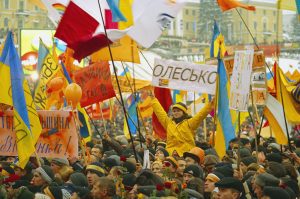
Chinese President Xi Jinping on September 16 appealed to Russia, India, and other members of the Shanghai Cooperation Organisation (SCO) to cooperate with each other in order to prevent foreign powers from destabilising their countries by inciting “colour revolutions”.
- Colour revolutions refer to a series of uprisings that first began in former communist nations in Eastern Europe in the early 2000s, but are also used in reference to popular movements in the Middle East and Asia.
- Most have involved large-scale mobilisation on the streets, with demands for free elections or regime change, and calls for removal of authoritarian leaders.
- Orange Revolution: It refers to a series of protests that occurred in Ukraine between November 2004 and January 2005.
- Tulip Revolution: Also called the First Kyrgyz Revolution, the movement led to the ouster of Kyrgyzstan’s President Askar Akayev in early 2005.
- Jasmine Revolution: The popular uprising that occurred between December 2010 to January 2011 in Tunisia was in response to the underlying corruption, unemployment, inflation and lack of political freedoms in the country.
SCO Summit 2022:
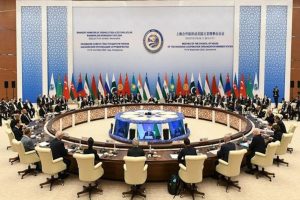
The Shanghai Cooperation Organisation (SCO) summit 2022 was held recently in Samarkand, Uzbekistan.
- Samarkand declaration was signed by the member states.
- India takes over Presidency of the SCO for 2023.
- The Samarkand declaration advocated “commitment to peaceful settlement of differences and disputes between countries through dialogue and consultation”.
- They stress that the principles of mutual respect for sovereignty, independence, territorial integrity of States, equality, mutual benefit, non- interference in internal affairs, and non-use or threat of use of force are the basis for sustainable development of international relations.
- The member countries are planning to develop common principles and approaches to form a unified list of terrorists, separatist and extremist organizations whose activities are prohibited on the territories of the SCO member states.
- Russia is also looking at more customers for its gas as Western countries look to cut their dependence on it.
- Russia suggested that the organisation should think about holding its own big athletic event.
- India urged Shanghai Cooperation Organisation member states to give each other full right to transit, as it would enhance connectivity and help in establishing reliable and resilient supply chains in the region.
- As the whole world is facing an unprecedented energy and food crisis, India emphasised the initiative to promote millet and address issues related to food security.
- World Health Organisation (WHO) opened its Global Center for Traditional Medicines in Gujarat in April 2022.
- This was the first and only worldwide centre for conventional medicine established by the WHO.
- Varanasi was declared as the SCO Tourism and Cultural Capital for 2022-2023 to promote the rich cultural and historical heritage of the people and the tourism potential of SCO member states.
- Further, it will promote tourism, cultural and humanitarian exchanges between India and the SCO member Countries.
- It also underlines India’s ancient civilizational links with the Member States of SCO, especially the Central Asian Republics.
- Under the framework of this major cultural outreach program, a number of events will be hosted in Varanasi during 2022-23.
Asiatic Caracal:

Caracal, which was used by India’s nobility in the sport of coursing like the cheetah, is struggling to survive, although both species had a similar distribution in the past.
- The Asiatic caracal is a medium-sized and locally threatened cat species, which has been widely reported to be on the brink of extinction in India.
- It is also known by its persian name Siyahgosh or ‘black ears’.
- They are found mostly in Rajasthan, Gujarat and Madhya Pradesh and are located in Kutch, the Malwa Plateau, the Aravalli hill range.
- Besides India, the caracal is found in several dozen countries across Africa, the Middle East, Central and South Asia.
- It occurs in semi-deserts, steppes, savannah, scrubland, dry forest and moist woodland or evergreen forest.
- It prefers open terrain and drier, scrubby, arid habitats and needs cover.
- Large-scale hunting, illegal trading and loss of natural habitats are considered significant threats to the species.
- Protection Status:
- IUCN Red List: Least Concern
- Wildlife Protection Act, 1972: Schedule I
- CITES: Appendix I
Green Fins Hub:
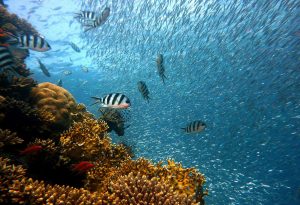
The United Nations Environmental Programme (UNEP), along with the UK-based charity Reef-World Foundation, launched the Green Fins Hub.
- Green Fins Hub is a global digital platform for diving and snorkeling operators worldwide.
- Green Fins is a proven conservation management approach implemented internationally by The Reef-World Foundation and the UNEP which leads to a measurable reduction in the negative environmental impacts associated with marine tourism.
- Originally established in Thailand in 2004, the Green Fins approach is a tool for supporting adoption and implementation of best practices in the diving and snorkeling tourism industry.
- It aims to protect coral reefs through environment-friendly guidelines promoting sustainable diving and snorkelling.
- It provides the only internationally recognised environmental standards for marine tourism and its robust assessment system measures compliance.
Green Fins Hub:
- The Green Fins Hub is the first-ever global marine tourism industry platform.
- It would give sustainable marine tourism a ‘major boost’.
- It is expected to scale up to reach a potential 30,000 operators worldwide from about 700 operators across 14 countries.
World Ozone Day:

World Ozone Day, also known as the International Day for the Preservation of the Ozone Layer, is observed annually on September 16 to bring attention to the ozone layer and the dangers of ozone depletion.
- This years theme is “Montreal Protocol@35: Global Cooperation Protecting Life on Earth” which recognises the wider impact the Montreal Protocol has on climate change.
- In 1994, the UN General Assembly proclaimed 16 September the International Day for the Preservation of the Ozone Layer, commemorating the date of the signing, in 1987, of the Montreal Protocol on Substances that Deplete the Ozone Layer.
- Montreal Protocol is an international treaty designed to protect the ozone layer by phasing out the production of numerous substances that are responsible for ozone depletion.
- It was agreed in 1987 and entered into force in 1989.
- Due to its widespread adoption and implementation, former UN Secretary-General Kofi Annan hailed it as perhaps the single most successful international agreement.




